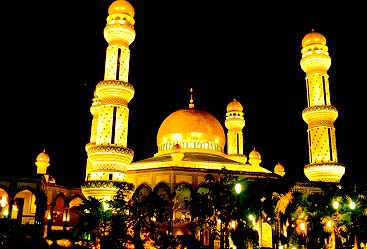
Negara Brunei Darussalam

An introduction to the geography, economy and people of Brunei.
Brunei Facts
Brunei has a tropical climate, which is hot, humid and wet. It is "cut" into two parts at the middle by the Brunei Bay (part of the South China Sea) and Sarawak (a state of Malaysia). The capital city of Brunei is Bandar Seri Begawan. Its land area is about 5765 km² and its coastline is 161 km long. Natural disasters rarely occur here. Most of Brunei's land (about 85%) is forested. Flat coastal plains rise to mountains in the east and mangrove swamps, rivers and hills in the west. Bukit (Mount) Pagon in the east is the highest mountain, about 1840 m tall. The only major natural resources in Brunei are crude oil and gas.
Brunei was granted independence on the 1st of January 1984 from the United Kingdom. Brunei is a sultanate. The Sultan and Prime Minister His Majesty Paduka Seri Baginda Sultan Haji Hassanal Bolkiah Mu'izzaddin Waddaulah is both the head of government and the head of state. The Council of Cabinet Ministers is appointed and presided over by the monarch and deals with executive matters. There is also a Religious Council whose members are appointed by the sultan that advises on religious matters, a Privy Council whose members are appointed by the sultan that deals with constitutional issues (law) and the Council of Succession whose members are appointed by the sultan that determines the succession to the throne if the need arises. There are no elections as the monarch is hereditary (meaning that if you are the eldest son of the sultan you will become the next sultan).
Brunei is a very wealthy state, so wealthy that food and housing is subsidised, housing loans are provided interest-free, health care is completely free and its citizens do not need to pay income tax. 95% percent of its exports are oil and gas. Lately, due to the 1997 Asian economic crisis, Brunei's government has tried to reduce its reliance on oil as oil prices are volatile and its supply of oil on which it depends on will be depleted (in plain language, gone) in about 25 years' time. Brunei has some agriculture and produces rice, pepper, sago and bananas. Brunei's unemployment rate is about 5% and its inflation is at 1%. One Bruneian dollar (B$) is equal to 100 Bruneian cents or one Singapore dollar. The Bruneian dollar is pegged to the Singapore dollar.
The population of Brunei is about 340,000 and the population growth rate is about 2%. Life expectancy is around 74 years at birth. Brunei is mainly Malay (62%) and Chinese (15%). Indigenous groups (6%) and other races (17%) make up the remainder of the population (23%).
Religions in Brunei are Islam (official) 67%, Buddhism 13%, Christianity 10%, indigenous beliefs and other 10%. Languages spoken in Brunei are Malay (official) (note: in Malay, 'c' is pronounced 'ch'), English, Chinese. The literacy of the total population is 88.2%.

Ideally, this website should be viewed using Internet Explorer 5.